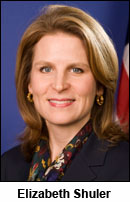OPINION
America’s women, families need national paid family leave law
 By ELIZABETH SHULER
By ELIZABETH SHULER
(Dec. 11, 2013) — Only 12% of the workforce has paid family leave. While the Family and Medical Leave Act (FMLA) — the nation’s only federal law designed to help working people meet the dual demands of job and family — has kept millions of people from losing their jobs when serious medical needs arise, it doesn’t cover 40% of people on the job. In addition, the FMLA only guarantees unpaid leave, which is unaffordable for many working women and families.
The issue of access to paid family leave is one of the serious problems the U.S. Department of Labor is examining on the 50th anniversary of the report of the President’s Commission on the Status of Women. Policy priorities like women’s economic security and paid family leave are gaining new attention — and for good reason. The gains women made leading up to the 1990s in workforce participation and pay have come to a grinding halt. Women remain overrepresented in low-wage jobs, even though more women than ever are going to college and getting advanced degrees.
 But lack of access to paid family leave doesn’t just affect women — it affects whole families, all of us. At some point, nearly everyone needs time away from work to recover from a serious illness or care for a sick loved one or new child. Fewer than 40% of workers have personal medical leave through an employer-provided disability program.
But lack of access to paid family leave doesn’t just affect women — it affects whole families, all of us. At some point, nearly everyone needs time away from work to recover from a serious illness or care for a sick loved one or new child. Fewer than 40% of workers have personal medical leave through an employer-provided disability program.
Here are some things the FAMILY Act would do, via the National Partnership for Women & Families:
► Provide workers with up to 12 weeks of partial income if they take time from work for a serious health condition, pregnancy and childbirth recovery, the serious health condition of a child, parent, spouse or domestic partner, the birth or adoption of a child; and/or for particular military caregiving and leave purposes.
► Enable workers to receive 66% of monthly wages.
► Cover workers in all companies, no matter the size.
In tough economic times, it’s challenging for families to make ends meet while having to balance caregiving responsibilities. Having a social insurance program, not unlike Social Security, would go a long way toward alleviating these issues.
Paid family leave is also good for employers. Despite what you may hear, more small businesses support this policy than oppose it. And, as Eileen Appelbaum and Ruth Milkman document in their recent book on California’s paid family leave program, large majorities of California businesses report the law’s impact on productivity, profitability and performance is negligible or positive. The sky didn’t fall. We can get this right.
The challenge for all of us is to make sure good legislation and a new focus on these issues goes beyond rhetoric and becomes the new reality for women and families.
A coalition of determined working families and activists came together to pass the FMLA in 1993. It’s time to act once again. We can take a solid next step on the road to economic equity for women and families by uniting to enact the FAMILY Act.
For more information on the FAMILY Act, visit www.NationalPartnership.org.
Elizabeth Shuler is Secretary-Treasurer of the AFL-CIO, one of three top-level officers for the federation. The first-ever woman elected to the position in 2009, Shuler also holds the distinction of being the youngest officer ever to sit on the federation’s Executive Council. This column first appeared at AFL-CIO Now.





